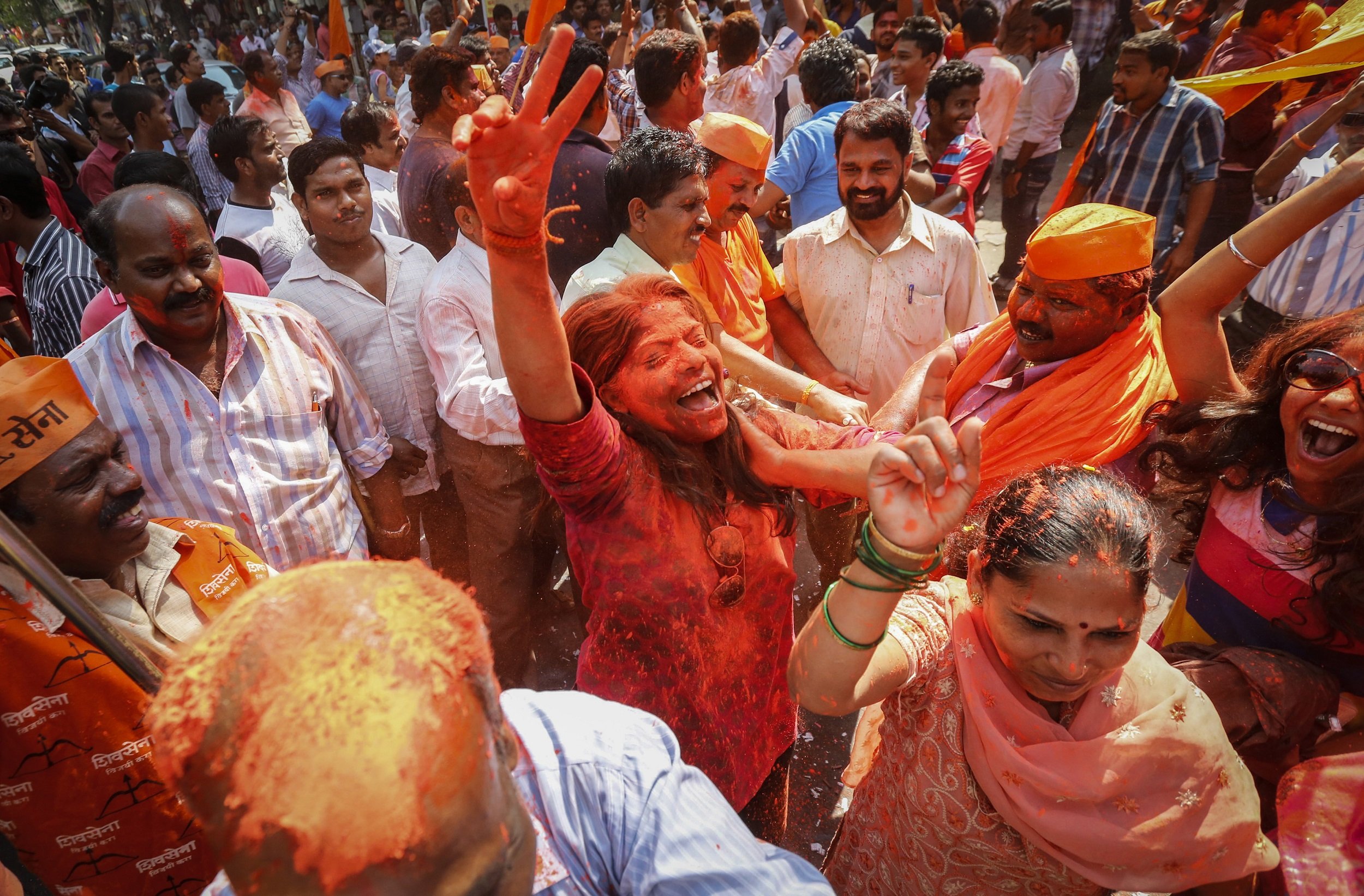
Narendra Modi and his fellow leaders of the Bharatiya Janata Party (BJP) believe they are on a ten-year mission to turn India into a successful world power with a strong nationalist base. Today (October 19) they have put two more building blocks in place, with two state assembly election victories in Maharashtra and Haryana, where they have ousted Congress Party governments and reduced that party to a humiliating also-ran role.
They have not, however, done as well as they had hoped, because they have not won overall control in Maharashtra. Nevertheless, Modi has broadened the BJP's base in the country and will now be able to implement his message and new policies more easily in the two states. The results also improve the BJP's minority position in the indirectly elected Rajya Sabha (upper house of parliament), where the Congress Party and other opposition parties can currently block the government's legislation.
In Haryana, adjacent to Delhi, the BJP has won outright control with 47 seats in the 90-seat assembly, compared with just four in the last election. It has ousted a Congress government that has been in power for ten years and was widely perceived to have facilitated corrupt land deals involving, among others, Robert Vadra, Sonia Gandhi's businessman son-in-law. Congress won just 15 seats, down from 40.
In Maharashtra, the BJP has won 124 seats and is by far the biggest party, but needs support to establish a majority in the 288-seat assembly. Maharashtra has been run by Congress-led governments for 15 years, and the outgoing coalition with the Nationalist Congress Party (NCP) was riven with corrupt land and infrastructure deals that Prithviraj Chavan, who was shipped in as chief minister by Sonia Gandhi four years ago to clean up the government, has admitted he was unable to stop.
In an attempt to remain politically relevant (and maybe protection from corruption inquiries), the NCP has offered the BJP the support of its 40 assembly members. The Shiv Sena, a state-based chauvinist and often violent party which has 62 seats and has been a BJP ally for 25 years, is thus a more natural supporter despite sharp clashes during the election campaign.
There will be much debate about whether the BJP's failure to win outright in Maharashtra marks a gradual dwindling of the popular wave that swept Modi to power nationally in May. He campaigned extensively in the state, but could not sufficiently reduce the power of the Shiv Sena, which is renowned for its street-level gangs and power, nor of the moneyed NCP, whose leaders include Sharad Pawar, a veteran national and regional politician, and Praful Patel, a controversial aviation minister in the last Congress government.
The main loser is the image and clout of the Congress Party, led by Sonia and Rahul Gandhi, who must have expected defeat because they made fewer than 20 appearances during the campaigns, compared with a total of over 70 meetings addressed by Modi and Amit Shah, the powerful BJP president. Congress came third in Maharashtra after the BJP and Shiv Sena and almost the same as the NCP, while in Haryana it came third behind not just the BJP but also the local-based Indian National Lok Dal, whose former leader and chief minister, Om Prakash Chautala, is in jail for corruption.
This indicates a devastatingly declining role around the country, which there is no sign of Congress doing much to reverse in the short term. Rahul is making occasional forays to individual states to rebuild the party with democratically elected local young officials – he was in Punjab last week. This is a very long-term task and seems, on present reckoning, to be unlikely to interrupt Modi's ten-year prime ministerial dream and expanding role in state elections.
Modi's brand of personal showmanship and nationalism is currently winning, though he now has to meet people's aspirations with economic success and improved government administration and performance by public officials.
Prakash Javadekar, minister for information and the environment, says that it is not just the much-discussed new middle class that is aspirational, but also the poor. "They don't want to remain poor but to succeed through hard work and dignity," said Javadekar on a recent visit to the Foreign Correspondents' Club in Delhi. Modi, he said, reflected those aspirations as a prime minister who could deliver, was honest, kept promises and provided good governance. "This is the new reality of India", he added.
The messages of hard work and dignity rhyme with the broader nationalism preached by the BJP and by the RSS, its arch Hindu-nationalist mother organisation, whose activists have a simple view of a strong India that is respected worldwide as a modern version of an ancient Hindu civilisation. It is this vision that drives Modi and his ministers, raising the question of how much they will disturb India's broad-based traditions that have been built up since independence by Congress governments to embrace Muslims and other minorities.
For now, such issues do not worry most voters, who are more concerned with the price of food, the availability of jobs and the overall wellbeing of their families. The Gandhis and their Congress Party failed to satisfy these ambitions, so Modi has a chance to show he can do better.
John Elliott's IMPLOSION: India's Tryst with Reality is published by HarperCollins, India. He can be read at ridingtheelephant.wordpress.com.
Uncommon Knowledge
Newsweek is committed to challenging conventional wisdom and finding connections in the search for common ground.
Newsweek is committed to challenging conventional wisdom and finding connections in the search for common ground.





